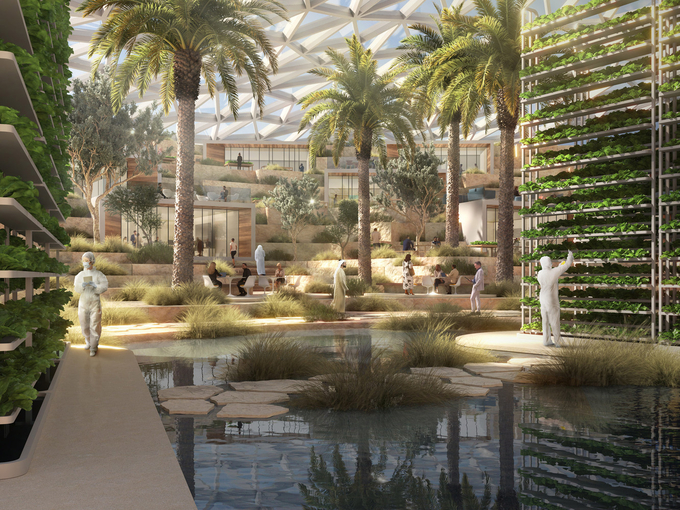June 17, 2025 | 10:24 GMT +7
June 17, 2025 | 10:24 GMT +7
Hotline: 0913.378.918
June 17, 2025 | 10:24 GMT +7
Hotline: 0913.378.918

Dubai’s rural and agricultural rich communities are best positioned to become a global benchmark for agritourism. Agri Hub is a highly attractive and activity-rich environment, which will transform Dubai into the world’s best rural visitor attraction in the world. It will provide spaces for local farmers to sell their products directly from their farms, whilst offering a new eco-friendly shopping, dining & edutainment experience for visitors - Baharash Bagherian, CEO of URB
URB to develop the world's largest agritourism destination in Dubai, providing food security and to foster sustainability of the local communities, heritage, and cultural landscapes. In line with the city's ambition of making its rural areas restorative land facilities, "Agri Hub" targets to create 10,000 new jobs across various sectors, including a new agricultural research institute and a public farm for educational and retail purposes.
The development is planned to become a net zero-carbon district based on water recycling, bio-saline agriculture, green transit systems, and onsite zero waste management. Featuring a biophilic design, a winding floor plan sets the greenhouse for easy access and walkability, enhanced by a series of patios alongside. The typology of the hub provides visitors with a unique agritourism experience while giving them a sense of being outside in nature.
The new hub will also feature a nature & heritage conservation center, an ecotourism center, an Agri-tech institute, and a wellness center. Planned to be located in Dubai's desert, Agri Hub aims to serve as a blueprint for decarbonized rural destinations of the future, starting with offsetting its embodied carbon emissions from construction and operation.
Dubai-based developer firm URB is leading ambitious projects that bridge into the future of sustainable cities. Recently launched plans, such as Africa's largest sustainable city and Xzero in Kuwait, look to optimize natural resources to create inclusive and competitive cities through agriculture, community development, and technology.
Dubai lans a new tech district to become a living laboratory for innovation and urban technology
A new urban tech district is planned for the Creekside of Al Jaddaf area in Dubai. Developed by URB, the district aims to generate over four thousand jobs in urban technologies, education, and training, while also welcoming entrepreneurs to encourage a collaborative tech ecosystem. The district will provide facilities for training, research, conferences, business incubations, shared-desk spaces, and dedicated offices. It will also be home to an urban tech institute, which hopes to drive innovation by investing in applied research and by enabling public-private partnerships.
The concept behind the development revolved around the idea that innovation and research centers such as these can inform the evolution of future cities. The tech-enabled urban district seeks to provide solutions to challenges in food availability, energy production, water harvesting, and zero-waste management. It also aims to develop more equitable living conditions by integrating technologies in the planning of cities, while also addressing environmental challenges and the threats of climate change.
The development is planned to become a net zero-carbon district, while also helping partner businesses reduce their carbon footprint. Each business in the district is expected to enroll in a tenant zero carbon engagement program, which hopes to tackle emissions by raising collective awareness and optimizing operational performance. The design of the buildings uses passive and active strategies for reducing the overall energy demand of the building. To provide occupational efficiency, safety, and security, the indoor lighting and temperature are automatically adjusted by sensors that monitor variables like the number of occupants in a room, time of day, and exterior weather.
The interior spaces also feature biophilic design to promote well-being and improve the office environment. The district provides a wide range of flexible working areas, all of which integrate greenery and natural elements as a proven way to increase the creativity, productivity, and happiness of employees. Breakout spaces with trees and landscaped gardens are also integrated into the design of the district. The integrated Urban Tech Institute further enhances this collaborative system by promoting networking events, conferences, workshops, lectures, and exhibitions. Overall, the Urban Tech District aims to provide the necessary support for innovators and entrepreneurs to develop more livable and resilient cities.
Across the world, innovation campuses are tackling various themes and challenges of urban environments. In Chicago, OMA recently unveiled the design of the new headquarters for the Discovery Partners Institute, which offers spaces for offices, laboratories, and classrooms where the students of the University of Illinois System can meet industry professionals. BIG also won a competition to design a Culinary Research and Innovation Hub in San Sebastian, while Snøhetta is designing the central building for Ford’s Research & Engineering Campus in Dearborn, Michigan.
(Archdaily)

(VAN) Extensive licensing requirements raise concerns about intellectual property theft.

(VAN) As of Friday, a salmonella outbreak linked to a California egg producer had sickened at least 79 people. Of the infected people, 21 hospitalizations were reported, U.S. health officials said.

(VAN) With the war ongoing, many Ukrainian farmers and rural farming families face limited access to their land due to mines and lack the financial resources to purchase needed agricultural inputs.

(VAN) Vikas Rambal has quietly built a $5 billion business empire in manufacturing, property and solar, and catapulted onto the Rich List.

(VAN) Available cropland now at less than five percent, according to latest geospatial assessment from FAO and UNOSAT.

(VAN) Alt Carbon has raised $12 million in a seed round as it plans to scale its carbon dioxide removal work in the South Asian nation.

(VAN) Attempts to bring down the price of the Japanese staple have had little effect amid a cost-of-living crisis.